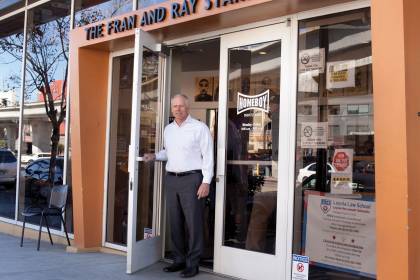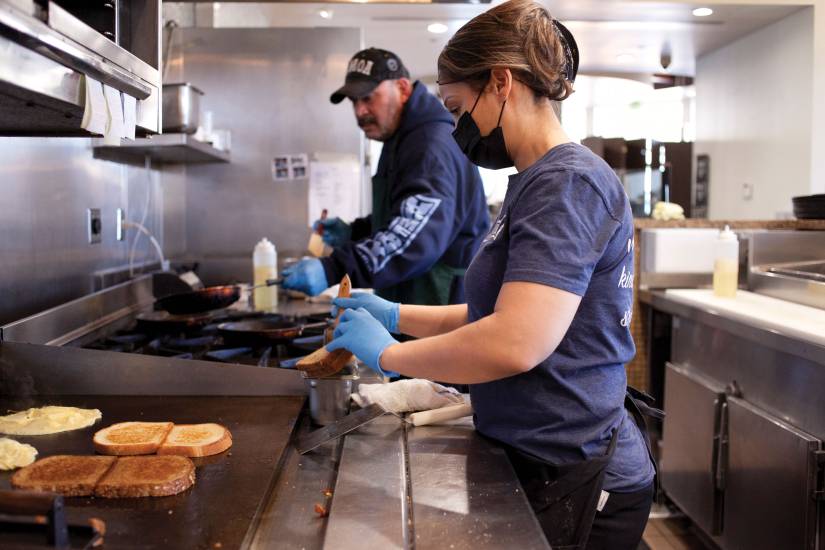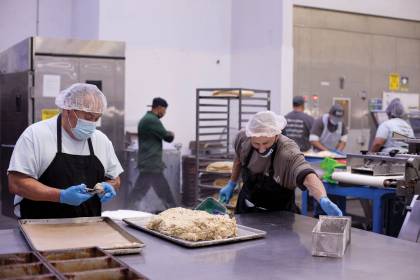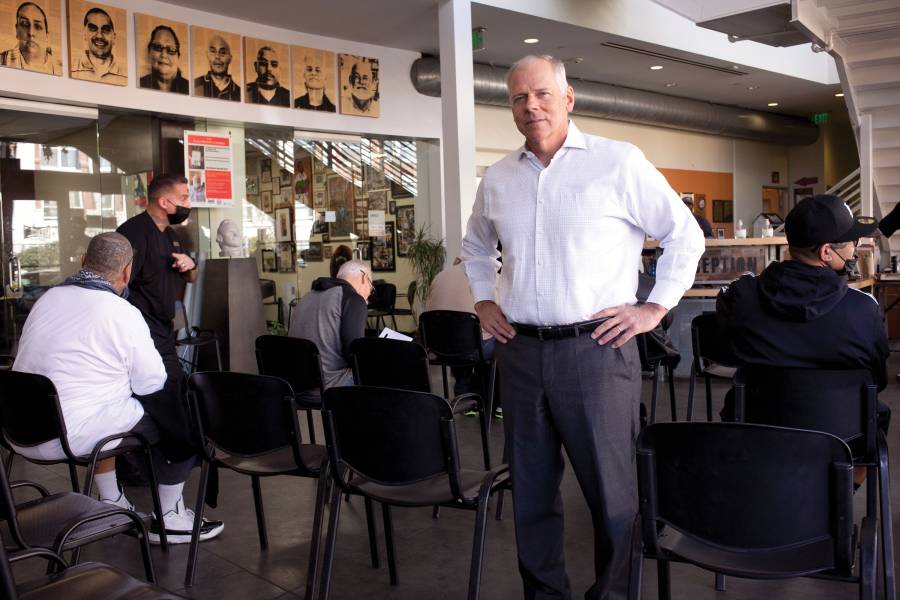In 2008, Tom Vozzo, Engr '85 (MS), sat at the top of the corporate world. He was an executive vice president of Aramark—a multibillion dollar publicly traded corporation in the food, facilities, and uniform business—and the president of Aramark Uniform and Career Apparel Group.
Then the Great Recession hit. On Christmas Eve, Vozzo received a phone call from top leadership saying he had to maintain an astronomical level of profitability in the units he oversaw. Vozzo immediately understood that would require layoffs.
The human cost didn't sit well with him. He stayed on the job long enough to help steer the company out of the recession, but by 2011, Vozzo knew it was time for a seismic career shift. He thought about doing something in private equity, but fate had different plans. Vozzo instead would become the chief executive of a celebrated but at the time penurious Los Angeles–based nonprofit organization with a mission to help formerly gang-involved and incarcerated people turn their lives around.

Image credit: Gregory Bojorquez
"I arrived at Homeboy exactly when they needed someone like me with the skill set of running successful organizations," Vozzo says in the prologue of his new book, The Homeboy Way: A Radical Approach to Business and Life (Loyola Press, 2022). "I also arrived at a time when I needed to learn more about myself and my spiritual trajectory."
"Homeboy" is Homeboy Industries, where Vozzo would soon become CEO, an unpaid position but one that has clearly brought him a level of joy, solace, and experience that money can't buy.
Most of those walking through Homeboy's glass front doors have not had an easy go of things. They're former or current gang members, many with prior convictions or war wounds from the streets.
Jessica Sanchez, for instance, is one of the 110 senior staff members at Homeboy. Like many of her colleagues, she came through the organization's ranks, first arriving as a court-mandated trainee six years ago. But Sanchez didn't take at first. She says she relapsed, reoffended, and had problems controlling her anger. Three years ago, she returned.
Today, Sanchez works at Homeboy in development and government relations. She also organizes and teaches a civic engagement class, which features guest professors from Los Angeles–area colleges. She says she strives to make sure more people are better informed about their rights, the justice system, local government, and more. She also says there's far more to Homeboy than just professional development. It's about transforming someone's narrative.
"We celebrate different versions of success at Homeboy," Sanchez says. "This person changed something about themselves, broke a generational curse. That's the most successful person in the room, and we give them recognition probably even more than someone who just got a job because that's the hardest work that there is to do."
Founded in 1988 by beloved Jesuit priest Father Greg Boyle, Homeboy Industries describes itself as the "largest gang intervention, rehab, and reentry program in the world," and it serves as a one-stop shop for social, human, employment, and educational services and community reentry programs. In 2007, the organization opened a 21,000-square-foot new headquarters near LA's Chinatown. This two-story space—flush with natural light from floor-to-ceiling windows—is a far cry from Homeboy's previous homes, which included space at the church where Boyle ministered and a small bakery in the city's Boyle Heights neighborhood that in 1999 was badly damaged by an electrical fire.

Image credit: Gregory Bojorquez
The new facility's exterior prominently features the organization's now-iconic logo and a smaller sign for the popular Homegirl Café located within. The space is large enough to hold the staff, trainees, some 10,000 community clients, and 10,000 other visitors who visit annually. The building, bustling with activity before the pandemic and still a socially distanced hive during it, somehow finds room for the managing and operation of the dizzying array of social enterprises Homeboy has today. There's Homegirl Café, Homeboy Bakery, a catering operation, an online food market, a silk-screening and embroidery shop, an electronics recycling business (acquired in 2017), Homeboy-branded apparel, grocery products such as salsa and chips, a farmers market team, and satellite cafés located inside Los Angeles City Hall and at Los Angeles International Airport. And when the pandemic hit, Homeboy launched an initiative called Feed HOPE, providing more than 400,000 meals to seniors, children, and people who are unhoused.
Homeboy is currently seeking permission to build a five-story, 36,000-square-foot residential building, where people receiving services could reside in 157 units. "A key aspect to getting out of gang life is you've got to really leave your neighborhood," Vozzo recently told Los Angeles magazine. "So, to get out of gang life you're giving up your support network."
Homeboy's headquarters also has space for tattoo removal services, parenting classes, GED diploma classes, Alcoholics Anonymous and Narcotics Anonymous meetings, and mental health therapy. Annually, thousands of people come through Homeboy—sometimes to work in the social enterprises but often for their first six months, just to take classes and heal. And Homeboy pays them to do all of the above, too. In 2020, there were 476 full-time "trainees" at Homeboy. That's the name given to employees, many of whom are working their first official jobs. That same year, more than 2,700 community members came for programs, and 154 people were placed at jobs.
"What we're about is helping people heal from their trauma so that they become resilient enough to move back into society and take on what society throws out," Vozzo said during a recent Zoom interview.
Or, as Father Boyle has said: "We don't hire homies to bake bread. We bake bread to hire homies." Other well-known Homeboy-isms include: "Nothing Stops a Bullet Like a Job" and, found emblazed on Homeboy apparel, "Jobs Not Jails."
"Greg is a living saint," Vozzo says of Boyle, and he is hardly the first person to say so. Boyle started Homeboy when he was pastor of an East Los Angeles church, the poorest Catholic parish in the area and home to multiple housing projects and gangs. In the 1990s, Los Angeles carried the label of gang capital of the world, and gang homicides peaked here in 1995. In 1992, the LA riots—or uprising, depending on who is describing it—happened following a jury's acquittal of four white police officers on trial for the video-recorded beating of Rodney King, a Black man. Fifty people were killed and 2,300 injured, and $1 billion of property damage was assessed.
Boyle's community-building skills of compassion, fairness, courage, and creativity are legendary. As of 2010, he had already attended at least 167 funerals for young people killed through gang violence. In addition to his nonstop work in the community, he's an in-demand public speaker and author of three books about the people he's met and lessons learned, The Whole Language (Simon & Schuster, 2021), Barking to the Choir (Simon & Schuster, 2017), and the New York Times bestseller Tattoos on the Heart (Free Press/Simon & Schuster, 2010). Greg Boyle is a lot of things. But he's not a businessman.
"Father Greg has never lost a minute's sleep wondering where next week's payroll would come from for his Homeboy crew," says Paul Vandeventer, co-founder and former president and CEO of Community Partners, another of Los Angeles' leading nonprofits—and one that was located just up the street from Homeboy Industries.
"For years, when finances looked bleak, Greg would let everyone know he was sending up a plea to heaven," Vandeventer says. "And pretty darn reliably, the answer to his prayers would come down in the form of a corporate or foundation grant, some city funds for gang intervention, a whole bunch of private individual gifts, or, on a good day, from everywhere all at once, and the books would balance again. Not the surest way to pursue a complicated mission but great civic theater nonetheless."
Enter Vozzo. In January 2011, Vozzo said goodbye to Aramark, ending his 26-year-stint. Born into a middle-class Italian immigrant family in New Jersey, Vozzo and his two brothers were the first generation to attend college. After graduating from Johns Hopkins, he went to work for a mom-and-pop catalog company in Boston, which was bought by Aramark. He climbed the corporate ladder quite well. Vozzo's Aramark severance package paid out $11,442.30 per week for 18 months, according to Securities and Exchange Commission filings. Vozzo had time on his hands, and a friend from the Salvation Army—who turned out to also be a Homeboy board member—introduced Vozzo to Homeboy, and the Aramark man started volunteering, with a focus on the organization's businesses. To put it kindly, Vozzo found them disjointed.
Meanwhile, in 2012, Homeboy Industries was having arguably its worst year—at least financially. Revenues were $10.8 million, and expenses $15 million. There was even talk around this time of replacing Boyle. Instead, with perhaps a push from the board, Boyle asked Vozzo to become Homeboy's part-time CEO. The conversation was low-key, not a hard sell, just a few days per week. Vozzo slept on it before saying yes. That part-time status then morphed into a full-time position—which to this day, is unpaid.
"When word got out of professional management coming to lead the organization, the heavens heaved a sigh of relief and so did the rest of charitable LA. Things are less dramatic now, and the Padre hasn't for a minute ceased his prayers," Vandeventer says.
"But for everyone who loves that Greg loves his flock, well, we're a bit more settled in knowing that Homeboy carries on even with just the ordinary, everyday miracle it takes for good management to do a good job doing good."
When I sat down with Vozzo, the CEO was on vacation out of state. He wore a signature Homeboy Industries ball cap and a crisp long-sleeve Johns Hopkins track and field T-shirt. "My son, Paul, was a pole vaulter," says Vozzo, of his son who graduated from JHU in 2015.
"When I started at Homeboy, I had all the hubris of a corporate CEO, thinking I could help, I know what I've got to do," Vozzo says. "Father Greg greatly slowed me down and just asked me to get involved and be part of the community."
Every day at Homeboy begins with a "Morning Meeting" held at 8:50 a.m. that lasts for about 10 minutes. It takes place on the first floor, in the large waiting room on the other side of the doors leading into Homegirl Café. During the meeting, announcements are made, birthdays are shouted out, and anniversaries are celebrated, including for sobriety. The bakery's special of the day also gets some love. Finally, someone delivers a "Thought of the Day," often moving, motivational, humbling, or stirring remarks. Then, those assembled fan out.
One of those assembled is Jose Arellano, Homeboy Industries' director of case management and navigation. In Homeboy nomenclature, a "navigator" is someone who helps guide trainees through the services the organization offers and the challenges they face.

Image credit: Gregory Bojorquez
Arellano first came to Homeboy nine years ago, not long after Vozzo. He'd done time in state prison, where he earned a GED diploma. At Homeboy, he started as a trainee, became a navigator, and worked his way up to becoming a member of Homeboy's executive team. Half of that team are people promoted from within, Vozzo says.
What's the one thing Arellano would most want someone to know? "Homeboy is a place that creates space for everyone that walks through the doors," he says.
Arellano was once among them. "I grew up through generations of drug abuse and alcoholism," he says. "And eventually I succumbed to those circumstances, and I became part of the problem. After a long period of being incarcerated, I came home and I wanted something different. Homeboy was that place that gave me the opportunity to have something different, and I was able to heal from everything I had been through."
As Arellano has changed during the past decade, so has Homeboy. "Night and day," Arellano says. "We have stability for the first time ever in the history of Homeboy."
Arellano credits Vozzo for the turnaround and majestic growth. "We were in a pretty bad spot, to be honest with you," Arellano says. "He came in and he really changed the trajectory. It was a lot of work … to get us on a good footing. And he stuck around, dedicated and committed to the mission of Homeboy. He got us to a place where it feels like we finally can lift our heads to breathe a little bit."
From 2012 to 2019, Homeboy's revenues rose by nearly 70%. In 2020, Homeboy won the Conrad N. Hilton Humanitarian Prize, which came with $2.5 million in unrestricted funds. Last year, MacKenzie Scott sent $20 million and the state of California pledged $15 million over a three-year period. Today, Vozzo says, "we're a $30 million nonprofit. Which means we bring in $30 million [per year] and we spend $30 million."
Patricia Soung is a juvenile justice advocate and attorney. She has layers of experience with Homeboy, from enjoying chilaquiles and Mexican mocha at Homegirl Café, to representing young people who have wound up at Homeboy, to, when she was youth policy director of the Children's Defense Fund–California, being the point person creating a coalition of approximately 15 organizations that seek to transform the youth justice system. That coalition is called LA Youth Uprising, and Homeboy is a member.
"Homeboy in many ways pioneered some of the approaches to services," Soung says, noting factors including their hiring of people who have been through the system, their recognition of local gang dynamics, their entrepreneurship, and the number of people they serve. "Homeboy is a recognizable brand," Soung says. "That's just not true for most nonprofits that do this sort of reentry work. By sheer scale they have been impressive and really valuable and a model to other nonprofits."
Indeed. Next year, Homeboy Industries will celebrate its 35th anniversary. From those humble 1988 roots, the organization has grown to have influence far beyond LA. There is now a Global Homeboy Network, composed of like-minded allies in 340 cities in 48 U.S. states, districts, and territories, as well as 12 countries.
That said, Soung and others paying attention are familiar with the many challenges faced by the Homeboy community. "Homeboy knows—as does anyone working with this population—once you're in the system, how hard it is to get out. You end up in the system—and you in our country meaning mostly Black and brown young men—by virtue of a lot of factors working against you, even before you ever have any sort of police contact."
While working in the corporate world, Tom Vozzo often had to measure success by profit and loss statements, stock prices, and the like. Today, one of his favorite data points is about recidivism. Vozzo says that statewide, seven out of 10 people in prison wind up going back. For members of the Homeboy community, he says an independent study showed that number to be three out of 10.
"Our country, our county, our state, our city have seen astronomical recidivism rates for decades; that's a known fact," Soung says. "The criminal justice system does not produce great outcomes when it comes to recidivism. Over the years, advocacy groups and lawmakers have done better in terms of appreciating how to better measure whether we're serving people well through the criminal justice system or through alternatives. Meaning, we're not just going to look at whether they have been rearrested, redetained, reprosecuted but also think about well-being. Did they gain new skills? Did they get connected to a mentor? Did they improve their overall physical and mental health through therapy or other sort of treatments?"
At Homeboy, the answer to those questions is quite often yes. And thanks in part to the example they set, more and more people are coming around to understanding these issues.
Throughout the pandemic, Vozzo says he and other members of the administrative team have gone into Homeboy headquarters around twice per week. This is to limit the number of people in the building and allow for social distancing. Otherwise, the organization's in-person work has continued, as has fundraising.
"We've never lost credibility with people who are looking at a gang life because we have way more people showing up every day than we can handle," Vozzo says. "But I also want to say with this pandemic, there's been a shift. Society sees how easy it is for people to be food insecure, and people have been enormously generous with donating money to credible practitioners who do the work with people on the margins of our society."
Also see
And, as is often said, COVID-19 has been one of two pandemics currently at hand. The other, of course, is racism, amplified through "the George Floyd tragedy and the protests and the marches," Vozzo says. "People also recognize that we're a credible practitioner really fighting against the notion that some people aren't as good as other people, and we authentically work on those issues each and every day."
When Vozzo set out to write his book, beginning back in January 2020, he says he wanted to share some business lessons from the nonprofit world to the for-profit world. He wanted to impart what he'd learned in his own spiritual growth. And he wanted to be straight-up with people who might be unaware of lives being lived outside of their own. Mission accomplished.
"There's two Americas: The America that you and I live in, and the America that the poor live in, and the challenges are mighty," Vozzo says. "For our society, when the poverty rate has been the same for 45 years, we need to do something different. Homeboy's been on the forefront of changing that and helping people move their lives forward."
Posted in Politics+Society
Tagged alumni, nonprofits, homeboy industries








